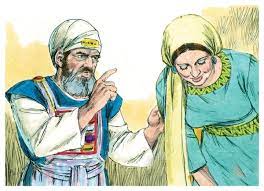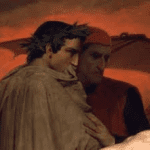Last Sunday’s lectionary reading from the Hebrew Scriptures is the story of God’s call of the young boy Samuel from First Samuel. Samuel was one of my role models as a child, because as a child he was perceptive enough to be able to hear the voice of the divine calling him when the grownups couldn’t hear a thing. But this is the second half of the story. The first half of the story is a tale with many familiar elements from the narratives in the Jewish scriptures: a powerful and faithful woman surrounded by mansplaining and clueless males who, although in social positions of power, have a lot to learn.
The story is set in the late period of the judges in Israel. Hannah is the favored (and presumably younger) wife of Elkanah, a faithful man of the tribe of Ephraim. Peninnah, Elkanah’s other wife, has several children (we don’t know how many, but there are “many sons and daughters”), while Hannah has no children because “the Lord had closed Hannah’s womb.” In a typically human move, Peninnah uses Hannah’s barrenness against her; the text reports that Peninnah “kept provoking [Hannah] in order to irritate her,” to the point that Hannah “wept and would not eat.”
We’ve seen this story before—think, for instance of Sarah’s jealousy when Hagar gives birth to Abraham’s son Ishmael while the son promised to Abraham and Sarah has noticeably not shown up. Or of Rachel, the beautiful and favored wife of Jacob, who has no reason to be jealous of her less beautiful, older sister Leah—whom Jacob does not love but had to marry in order to marry Rachel—except that Rachel has no children and Leah has ten sons and counting. The stage is set for continuing drama worthy of a “Wives of the Ancient Middle East”-style reality show.
In Hannah’s case, well-meaning but totally clueless Elkanah doesn’t help the situation when he mansplains to Hannah why she actually has no reason to be sad. He asks “Hannah, why are you weeping? Why don’t you eat? Why are you downhearted? Don’t I mean more to you than ten sons?” I’m sure that Hannah’s unrecorded response was along the lines of “No, jackass, as a matter fact you don’t mean more than ten sons to me. In this patriarchal iron age world where a woman’s worth is calculated by how many sons she has, you definitely are not worth even one son, let alone ten. You want to know how to help? Get that bitch Peninnah off my back!” Or something like that. Maybe Hannah was nicer than I would have been.
One year at Shiloh, the establishment where Elkanah and the family went annually to sacrifice and worship, Hannah went off by herself and, “weeping bitterly,” begged God for a son, promising to dedicate that son to God should her prayer be heard and answered. She prayed silently, but her lips were moving. Enter another well-meaning but clueless male. Eli, the father of the two priests in charge at Shiloh, concluded that this weeping and mumbling woman was drunk. “How long are you going to stay drunk?’ Eli asked. “Go put away your wine.”
The Hannah of my imagination, sick to death of male obtuseness and mansplaining, thinks “Oh for God’s sake, old man, leave me the F alone! The Lord and I are trying to have a conversation here! Get out of my face!” Showing great self-control, Hannah says “I am a woman who is deeply troubled [idiot]. I have not been drinking wine or beer [moron]; I was pouring out my soul to the Lord. Do not take your servant for a wicked woman; I have been praying here out of my great anguish and grief.” Eli, to his credit, realizes his mistake and wishes her well—but wisely doesn’t guarantee anything.
We learn subsequently, of course, that Hannah does become pregnant, her son Samuel is dedicated to the Lord as she promised (which means that Eli ends up being his father figure and unwitting mentor in things concerning the divine), and Samuel becomes a major player in the events that move the Jewish people from a loose tribal confederation to a fledgling nation. Samuel, acting as the representative of God in these events, anoints Saul, then David, as the first two kings of Israel.
Hannah gets center stage one last time in the next chapter with “Hannah’s Prayer,” a powerful song of thanksgiving, prophecy, and justice that Mary, the mother of Jesus, clearly had in mind when she sings her similarly powerful Magnificat of thanks centuries later. We would do well to embrace the grace and power of Hannah, this beautiful and apparently insignificant woman who simply wanted to be treated fairly and to be a mother.
The bows of the warriors are broken, but those who stumbled are armed with strength.
Those who were full hire themselves out for food, but those who were hungry are hungry no more.
The Lord brings death and makes alive; he brings down to the grave and raises up.
The Lord sends poverty and wealth; he humbles and he exalts.
He raises the poor from the dust and lifts the needy from the ash heap;
He seats them with princes and has them inherit a throne of honor.
Let it be so.













